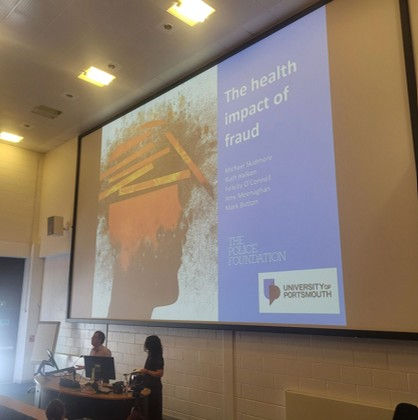ADOPTED PROJECT: Exploratory research to examine the health impact of scams and fraud and the current knowledge and systems in the police and partner agencies for targeting and delivering victim support services

Team: Ruth Halkon
Dr Michael Skidmore
Dr Felicity O'Connell
Dr Amy Meenaghan
Professor Mark Button
Start Date: 1st May 2024
End Date: 30th November 2024
Project Partners: Police Foundation and University of Portsmouth
This research explores how being a victim of fraud affects people’s health and wellbeing and what help they need to recover. We used surveys and interviews to reach fraud victims and spoke to the professionals who support them.

How fraud affects health
Most fraud victims have emotional or mental health problems. In the study, 92% had at least one symptom. Common issues included worry (58%), stress (56%), fear of becoming a victim again (52%), and feelings of anger (46%), weakness (46%), or distress (45%). Victims also had more serious symptoms like depression (18%), hopelessness (16%), panic attacks (8%) and feeling out of control (14%). Physical health was also affected. Over half (58%) of victims had symptoms such as trouble sleeping (45%), headaches (27%), or tiredness (24%). Changes in behaviour were common too. Victims often became distrustful (44%) or stopped going out (19%).
We found that symptoms often happened together. Victims with emotional symptoms often also had physical ones. We found six separate patterns or “clusters” of symptoms, such as a “worry and distrust” group, and a more severe “hopelessness and self-harming” group. The impact varied widely. Some felt only mild, short-term symptoms. Others felt long-term effects that lasted for years. These were worse among the old or those in poor health. Nearly 19% said their daily lives were seriously affected. Some stopped using technology or thought of taking their own lives.
Why some victims are more affected than others
We found many things can impact how much a victim is affected including: the tactics used by fraudsters (e.g. building fake relationships or using threats), the amount of money lost, any pre-existing health issues, feelings of shame or self-blame, and lack of a support network. Victims who had a mix of these factors often suffered more.
What support do victims want or need?
Many victims wanted practical help – such as advice on avoiding further fraud or help getting their money back. Others wanted help to come to terms with what had happened. But only those the police deemed "vulnerable" received further support. The report highlights a mismatch between what victims want, what they need, and what is available. Some people who could benefit from support don’t qualify or don't think they need or deserve it. The concept of "vulnerability" is also vague and needs to be better defined.
How services should improve
Many victims felt blamed, ignored or treated with suspicion by the police, banks and tech companies. This often made their health worse. Those who got the right help from family and friends, case workers or peers were best able to recover from the fraud. Recommendations include:
•Keep support options open beyond the initial police report.
•Define vulnerability more clearly in policy.
•Adopt trauma-informed approaches across all service
•Launch public campaigns to challenge victim-blaming attitudes and explain how fraud happens.
In short, we need better understanding and better support to help fraud victims recover and reduce long-term harm.
What did we do with this new knowledge
This study has been completed but has not yet been published. It has been submitted to an academic journal and will also be published by the Police Foundation in the autumn.
The research study was presented at Portsmouth University’s 2025 Counter Fraud, Cybercrime and Forensic Accounting Conference in June, where it was the keynote speech. Through this conference we shared our findings with public health experts, academics, police leaders and representatives from the private sector.
We also hope to present the work at the Australasian and the Pacific Conference on Law Enforcement and Public Health, having been invited to present because of the global impact this research could have.
Where next?
This project was an exploratory study which we are planning to use as the basis of a much larger study. This is particularly important as while the impact of fraud is beginning to be known amongst specialist circles, it is a struggle to get this issue noticed in general policing/policy circles who do not realise there is a problem let alone understand the impact that our poor responses to fraud is having on millions of victims.
•We are currently in the purpose of drawing up a proposal for a follow up study. This study will explore a) the sheer scale of fraud, its impact on health, evidence gaps in relation to both; b) what is known about the policy response/interventions (e.g. what exists, what's known about the effectiveness of responses) Methodology:
•Phase 1: Review of: a) the evidence and theory to explain and account for the impact of fraud on victim health; b): of policy responses/interventions
•Phase 2: Empirical research: (not just the health impact of fraud but also policy responses/interventions)
•Phase 3: Develop a risk assessment tool and health toolkit to guide frontline support staff
•Phase 4: Preliminary evaluation of the toolkit
The project team for the new research proposal would include the Police Foundation and Portsmouth University along with Professor Mike Levi of Cardiff University and Thara Raj, Director of Public Health for Warrington.
